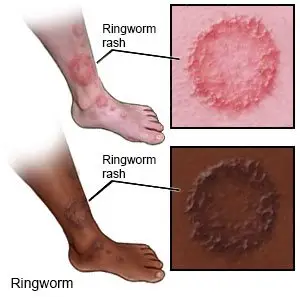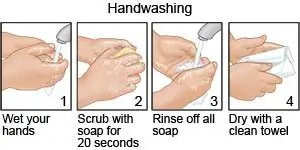What is tinea corporis?
Tinea corporis, also called ringworm, is a skin infection caused by a fungus. It usually affects the skin on the face, chest, or limbs. Tinea corporis is most common in children and athletes.
What increases my risk for tinea corporis?
Tinea corporis can be spread by touching an infected person or pet. You can also get it by touching or using items that have been used by that person or pet. Items include towels, clothes, and bed linens. In schools and daycare, include sleep mats and stuffed animals. In public places, items include pool or gym surfaces, wrestling mats, and shower stalls.
What are the signs and symptoms of tinea corporis?
Tinea corporis may begin as 1 or more flat, red patches. As the infection grows, it spreads out in a circle or ring, leaving normal-looking skin in the middle. At the edge of the ring, the skin is red and raised. It may be either dry and scaly, or moist and crusty. The infected skin may itch. The infection looks like you have a worm under your skin, but there is no worm.
 |
How is tinea corporis diagnosed?
Your healthcare provider may be able to tell you have tinea corporis by looking at your skin. Your provider may look at a skin sample through a microscope. This will help your provider know the type of fungus that is causing your infection.
How is tinea corporis treated?
Tinea corporis is usually treated with antifungal medicine that may be given as a cream or pill. Use the medicine until it is gone, even if it looks like your infection is gone sooner.
Treatment options
The following list of medications are in some way related to or used in the treatment of this condition.
- betamethasone/clotrimazole
- Lotrisone
- Lamisil
- ketoconazole
- Nizoral
View more treatment options
What can I do to prevent tinea corporis?
- Wash all items that come into contact with infected skin. Wash all towels, clothes, and bedding in hot water. Use laundry soap. Clean shower stalls, mats, and floors with a germ-killing or fungus-killing cleaner.
- Do not share personal items. Examples include towels, brushes, combs, and hair accessories.
- Keep your skin, hair, and nails clean and dry. Dry your skin before you put medicine on the infected area. Wash your hands often. Do not scratch your sores. This may cause the infection to spread.

- Do not participate in contact sports, as directed. Talk to your provider before you participate in contact sports, such as wrestling. Your provider may tell you to wait for 72 hours after you start treatment.
- Have infected pets treated by a veterinarian. A patch of missing fur is a sign of infection in a pet. Wear gloves and long sleeves if you handle an infected animal. Always wash your hands after handling the animal. Vacuum your home to remove infected fur or skin flakes. Disinfect surfaces and bedding that your animal comes into contact with.
When should I call my doctor?
- You have a fever.
- Your rash continues to spread after 7 days of treatment.
- Your rash is not gone within 2 weeks.
- The area around your sore becomes red, warm, tender, swollen, or smells bad.
- You have questions or concerns about your condition or care.
Care Agreement
You have the right to help plan your care. Learn about your health condition and how it may be treated. Discuss treatment options with your healthcare providers to decide what care you want to receive. You always have the right to refuse treatment. The above information is an educational aid only. It is not intended as medical advice for individual conditions or treatments. Talk to your doctor, nurse or pharmacist before following any medical regimen to see if it is safe and effective for you.© Copyright Merative 2023 Information is for End User's use only and may not be sold, redistributed or otherwise used for commercial purposes.




